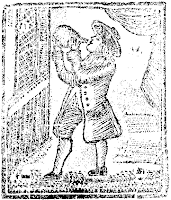 The Battle of Bunker Hill yielded one of those quotations that every American is supposed to know: “Don’t fire till you see the whites of their eyes!” Meaning, “Don’t use any of your gunpowder until they’re really, really close, so you won’t miss.” But it’s still debatable which American officer said this, if anyone. Some sources credit Gen. Israel Putnam of Connecticut, some Col. William Prescott of Massachusetts.
The Battle of Bunker Hill yielded one of those quotations that every American is supposed to know: “Don’t fire till you see the whites of their eyes!” Meaning, “Don’t use any of your gunpowder until they’re really, really close, so you won’t miss.” But it’s still debatable which American officer said this, if anyone. Some sources credit Gen. Israel Putnam of Connecticut, some Col. William Prescott of Massachusetts.
In 1788 David Humphreys published an Essay on the Life of the Honourable Major General Israel Putnam. I haven’t rustled up that edition, but I found an 1818 printing through Microsoft’s Live Search, and it did not contain the “whites of their eyes” quotation. That leads me to think the original didn’t have it, either.
Which means the first book attributing this quotation to Gen. Putnam might well be that great font of American myth, Mason Weems’s Life of George Washington, with curious anecdotes, equally honourable to himself and exemplary to his young countrymen. In the 1808 edition of that book (and perhaps earlier ones), Weems quoted Putnam saying:
Don’t throw away a single shot, my brave fellows; . . . don’t throw away a single shot, but take good aim; nor touch a trigger, till you can see the whites of their eyes.
As with his
legends of Washington and the cherry tree and Washington praying in the snow at
Valley Forge, Weems gave no source for this anecdote. He wasn’t a scholarly writer, and (unlike Humphreys) he didn’t know his subjects personally. But Weems’s biography was immensely popular in the early republic, and helped form the public understanding of Bunker Hill.
It’s no surprise, therefore, that a book titled
The Life and Heroic Exploits of Israel Putnam, published in 1847 and credited to the long-dead Humphreys,
did contain the famous quotation amidst the general’s other orders:
Powder was scarce and must not be wasted. They should not fire at the enemy till they saw the white of their eyes, and then fire low, take aim at their waistbands. They were all marksmen, and could kill a squirrel at a hundred yards; reserve their fire, and the enemy were all destroyed. Aim at the handsome coats, pick off the commanders.
This book then goes on to say, “The same orders were reiterated by Prescott at the redoubt, by Pomeroy, Stark, and all the veteran officers.” In other words, every top officer was giving the same orders, but Putnam gave them first.
That version of Putnam’s words, and the sentence that followed, came straight out of
Samuel Swett’s
History of Bunker Hill Battle, published first in 1818 and reissued in 1826. Swett’s appendix quoted the testimony of three men who said they had been in the battle: John Stevens of Frye’s regiment, Philip Johnson of Little’s regiment, and Elijah Jourdan. All said they heard Putnam speak about the “whites of their eyes” or heard other officers say those orders came from Putnam.
Swett and other New England historians saw such a sequence of orders as highly significant because, as the fiftieth anniversary of the battle approached, they had drowned themselves in ink debating who was in command of the provincial forces. Was it Putnam, Connecticut’s general and hero? Col. Prescott, in the redoubt? Gen.
Seth Pomeroy, who was in the ranks as a volunteer?
Dr. Joseph Warren, who had also been commissioned a general and was also in the ranks as a volunteer?
The good thing about this debate is that it spurred writers to find veterans of the battle and put their recollections into print. The bad thing is that so many of those sources were focused on boosting the case for a particular candidate for command rather than providing a complete picture of the action. Furthermore, if lots of officers were saying the same thing, it would be almost impossible for a soldier in one part of the line to know who said it first. Finally, all those reminiscences went into print
after Weems’s book, raising the possibility that his popular tale had affected how men recollected or recounted their experiences forty years before.
Richard Frothingham’s
History of the Siege of Boston, first published in 1849, attributed a variety of phrases to a variety of officers. “These phrases occur frequently in the depositions [of veterans], the same one often being ascribed to different officers.” Frothingham did cite Johnson saying Putnam had voiced the “white of their eyes” remark. However, since he concluded that Prescott did the most commanding during the battle, his book led many later writers to credit the colonel with the famous quotation, not Gen. Putnam.
The best
Boston 1775 guess? I think the weight of the evidence favors Putnam (shown above) with the “whites of their eyes” phrase, even if Prescott was doing more in the redoubt to make provincial soldiers hold their fire. But that doesn’t mean Putnam coined the phrase.
TOMORROW:
The real source of the quotation?
As I dug into the story of the Rev. John Morrison this week, I ended up using this helpful page of downloads from the state of New Hampshire. It offers the complete forty-volume set of New Hampshire State Papers as PDF files. The downloads aren’t swift, but the files load quickly considering how many pages they contain.











